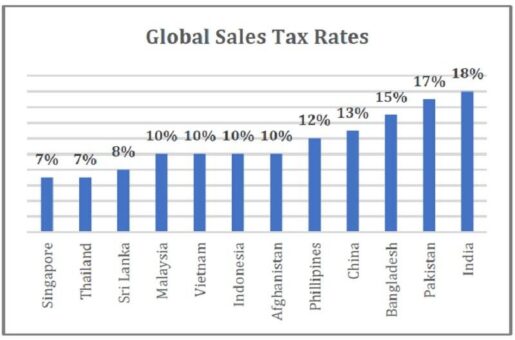KARACHI: The Federal Board of Revenue (FBR) has been urged to restore sales tax exemption on supply of LED or SMD lights as these are meant for conservation of energy.
Overseas Investors Chamber of Commerce and Industry (OICCI) in its proposals for budget 2022/2023 said that through Finance Act 2021, under 6th Schedule, Table II (local supply/sales stage), Serial no. 24: Exemption from sales tax on the supply of following had been withdrawn: LED or SMD lights and bulbs meant for conservation of energy, HS codes 8539.5010, 8539.5020, 9405.1030 and 9405.4020.
READ MORE: Minimum tax 0.2% suggested for listed chemical companies
It is recommended that sales tax at local supply/sales (Table II) of LED or SMD lights and bulbs meant for conservation of energy, HS codes 8539.5010, 8539.5020, 9405.1030 and 9405.4020 should be exempted as it would protect local industry setup/investment, would give it advantage over imported finished goods and provide cheaper energy efficient LED light to consumers.
The OICCI further highlighted that through Finance Supplementary Act 2022, under 6th Schedule of Table III of Sales Tax Act, sales tax exemption on import of parts and components for manufacture of LED lights was removed.
READ MORE: Proposals for capital gain on disposal of securities by insurance companies
It is recommended that sales tax exemption on import of parts and components for manufacture of LED lights under Table III of Sixth Schedule of Sales Tax Act should be restored as it would protect local industry setup/investment, would give it advantage over imported finished goods and provide cheaper energy efficient LED light to consumers.
The Finance Act 2020 declared only construction sector (person directly involved in the construction of buildings, roads, bridges and other such structures or the development of land) status as Industrial undertaking to enjoy benefit of imports of plant and machinery and other goods to be utilized in such activity as adjustable. This amendment does not include taxpayers involved in the execution of contracts and in providing of engineering services in the manufacturing, power producing and other industries and importing goods, raw material or plant & machinery.
READ MORE: FBR urged to align corporate tax rate for banks
It is recommended that taxpayers involved in execution of contracts and in providing of engineering services in manufacturing, power producing, and other industries are also included in the definition of “industrial undertakings”. Various imports are used in contract execution by companies which are not covered under Part I and II of the Twelfth Schedule, thus are also subject to minimum tax @ 5.5 per cent.
Further, the tax deducted on the contract execution under clause (c) of sub-section 1 of section 153 at the rate of 6.5% is also minimum tax on the income in terms of the provisions of sub-section 3 of section 153. it is obvious that there cannot be a double taxation of the same income, but it can be unnecessarily interpreted that the imports used in contract execution is subject to minimum tax at (i) the import stage and (ii) also on the income arisen of such contract execution. Due to such provisions taxpayer will be suffering minimum tax twice on the same income (i.e. @ 5.5 per cent at the time of import and 6.5 per cent at the time of contract execution / income from such contract execution) and can lead to litigation.
READ MORE: OICCI suggests duty cut on locally manufactured cars






